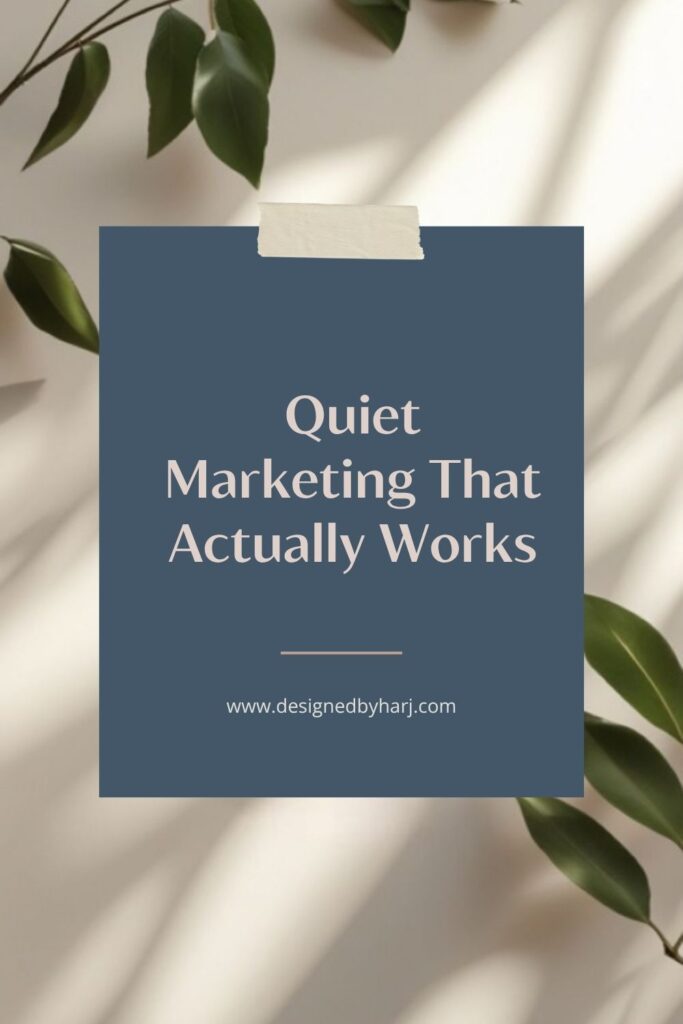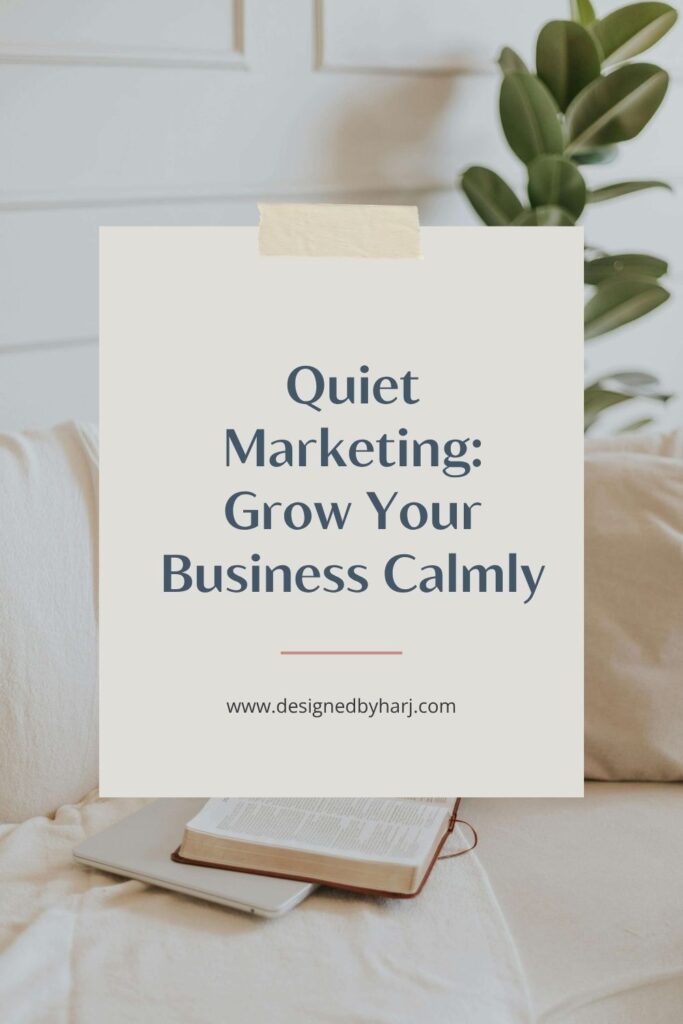TL;DR (What You’ll Learn):
Quiet marketing is a calm, sustainable approach to business growth. One that replaces pressure and performance with connection and consistency. In this post, you’ll learn what quiet marketing really means, how it works, and how to use it to grow your business online without performing on social media. You’ll also discover real examples, practical steps, and how this approach helps you attract your ideal clients!
Before we dive in, have you ever wished you could grow your audience online without relying on social media?
Download my FREE Guide: Plug & Play AI Blog Writing Prompts that took me from 3k to 50k impressions in under 6 months
(perfect if you want to grow your audience through quiet marketing!)
What Is Quiet Marketing?
Quiet marketing is about building visibility through authenticity, value, and long-term trust. It’s rooted in the idea that you don’t have to be loud to be seen.
Instead of chasing algorithms, quiet marketers focus on:
- Creating thoughtful content that helps their ideal client.
- Building SEO and AI-search visibility through consistent, evergreen content.
- Connecting through slow, genuine relationship-building (like email, blogging, or Pinterest).
I wish I knew about quiet marketing when I first launched my business. Well, I guess to be more accurate I should say: “I wish I trusted quiet marketing when I launched my business”. I always knew I wanted to blog to grow my business. But I let myself get distracted by social media and how other people were sharing their wins and results on Instagram. I kept getting shiny object syndrome and kept putting off my Blogging to try and get those same results on Instagram. But it just wasn’t for me, and I would burn myself out every few months. When I finally trusted my Blogging strategy and went all in, that was the first time I actually saw serious results from my marketing.
The lesson I learned: quiet marketing does work!
Why Quiet Marketing Works (Even in 2025)
Quiet marketing works because people are craving calm, trust-based connections more than ever. With the rise of AI search and content overload, clarity and depth stand out.
It works because:
- Your content lives longer when it’s optimized for search and AI.
- Clients find you when they’re actively looking for what you offer, not when they’re scrolling.
- You can create from a grounded, inspired place (not a reactive one).
Quiet marketing allows you to build strong connections with your audience through providing value and consistently showing up. And the best part? You can create this content from the comfort of your couch if you choose to! You don’t have to keep up with every changing trend and algorithm, you’re creating long-lasting client. If you choose to do this in the form of Blogging or Podcasting – you don’t even have to get dressed up! It’s honestly way to show up online as an introvert!
My audience finds me through my Blog, where I share my free offers in exchange for their emails. Once they’re on my email list I can continue to nurture those leads by sharing even more value and insights. Also, once they’re on your email list you can get even more personal building a stronger community.
And if you’re worried about AI affecting your Blog traffic (if that’s how you choose to quietly market), I found this interesting stat:
“75% of marketers believe that AI-enabled search engines will positively impact their blogs, and 68% predict that their site will get more traffic. Only 9% believe this will harm blog traffic” – Source: Hubspot
The Key Pillars of Quiet Marketing
Quiet marketing isn’t about doing less, it’s about doing what matters most. Here are the four pillars that make it powerful:
1. Clarity
Get clear on your message and ideal client before trying to get visible.
For example, my ideal clients are introverted entrepreneurs who want to grow their audience through quiet marketing strategies.
2. Content
Focus on creating value-based content that lasts, like blog posts, newsletters, and Pinterest pins.
Learn how your blog can help you get found in the age of AI: How Blogging Helps You Get Found in AI Search Results.
3. Connection
Quiet marketing is relational, not transactional. Think of your email list or blog as a cozy space where people get to know you.
4. Consistency
It’s not about doing everything but about doing the right things regularly.
Whatever timeframe you use just be sure it’s something you can realistically stick to. For example, if you can blog once a week then do that. Or if you can only blog once a month then do that! The most important thing is to stay consistent!
How to Start Practicing Quiet Marketing (Step-by-Step)
If you’re ready to make your marketing feel softer but still effective, start here:
- Audit your current strategy.
What’s actually bringing you results? (Hint: Check where your clients come from.) - Choose one long-form platform like blogging, YouTube, or a podcast, something searchable and evergreen.
- Create once, repurpose quietly.
Turn one blog into Pinterest pins, an email, and even a calm social post. - Focus on helping, not selling.
Every piece of content should teach, inspire, or help your readers in some way. - Track your calm growth.
Notice how you feel and I’m not just talking about numbers. Quiet marketing success often looks like peace and progress.
Having one form of long-form content and repurposing it to multiple short-form Pins has been life changing for me. Because:
- You’re maximizing all the work you just put in to writing a blog post
- You’re saving so much time because you’re not always starting from scratch!
Real Examples of Quiet Marketing in Action
- A wellness coach who builds clients purely through blog content + SEO.
- A brand designer who focuses on referrals, Pinterest, and blogs, not reels.
- A copywriter who uses email storytelling instead of daily posting.
My personal quiet marketing strategy is creating valuable and educational content through Blogging and repurposing it to Pinterest and a weekly email to my subscribers!
TL;DR Recap (What You Learned + How to Apply It)
Here’s your quiet marketing roadmap in a nutshell:
- Define your message and ideal client.
- Choose one long-form platform to show up consistently.
- Repurpose your content strategically.
- Focus on connection, not comparison.
- Let SEO and AI visibility work quietly in the background.
Next step: Download your free Plug & Play AI Blog Writing Prompts to help you create calm, searchable content that attracts your dream clients in the most cozy way!
FAQ: Quiet Marketing
Q1: Is quiet marketing just another term for slow marketing?
Not exactly. Slow marketing is about pacing; quiet marketing is about energy and intention; creating with calm clarity.
Q2: Does quiet marketing work if I’m just starting out?
Quiet marketing will give you long-term results. It’s not necessarily going to provide immediate and quick gratification results. That being said, you should still start quiet marketing right away so you can build those strong foundations for long-term visibility (SEO, AI search, and evergreen content).
Q3: Can quiet marketing really grow my audience without social media?
Yes, if you focus on searchable content (like blogs or Pinterest) and nurture your email list, you can grow sustainably without constant social posting. It just takes time and consistency but the results will compound over time.
Q4: How do I know if quiet marketing is working?
Look for consistent inquiries, higher-quality leads, and growth in your search impressions. It’s less about going viral, more about being discoverable by the right people.
Final Thoughts
Quiet marketing isn’t passive, it’s powerful.
It’s how you build a business that feels like you: steady, intentional, and quietly impactful.
And if you’re ready to create content that fits this way of working, start with my free Plug & Play AI Blog Writing Prompts that took my impressions from 3k to 50k in less than 6 months! They’ll help you show up online in a way that feels calm so you can eliminate the any overwhelm!
How Blogging Helps You Get Found in AI Search Results
Being an Introvert: How to Show Up Online Without Faking It
How Introverts Can Succeed in Business Without Social Media
Why Blogging Is Not Dead – It’s Just Smarter Now!
How To Make Marketing Plan You’ll Actually Stick To


